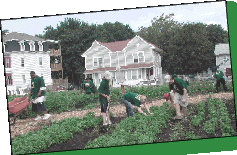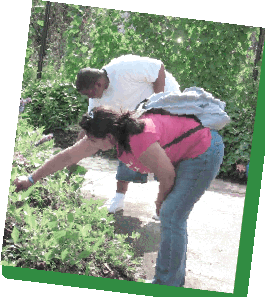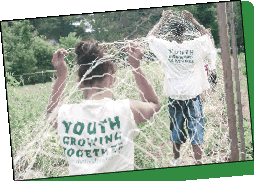 |
|
Farming at The Food Project in Massachusetts provides ample hands-on learning opportunities.
Photo: The Food Project |
While agriculture-based youth development programs are often associated with rural areas and programs such as 4-H and National FFA Organization, the last decade has seen an increasing emphasis on agriculture-themed youth development programs in all sorts of places, including cities.
For example, 30 percent of the youth 4-H serves are located in central cities, according to Jo Turner, foundation relations specialist with the National 4-H Council.
On a simple level, such programs can be an easy sell for youths. “Agriculture provides a real hands-on, learn-by-doing experience,” Turner says. “Kids can see results, and they get to do something physical.”
Individual program evaluations and anecdotal evidence suggest that teaching children and youth how to cultivate the soil, learn where food comes from and help run agriculture-based businesses produces observable benefits – from leadership and job skills development to better nutritional habits and less obesity.
Successful projects share some components.
Focus on Life Skills
Turner stresses that agricultural projects need to be combined with other life skills to play a truly effective role in youth development.
Civic Engagement: Agriculture programs typically include community service. In Lincoln, Mass., The Food Project supplies fresh produce free to shelters and soup kitchens, at discounted rates to low-income families and Women, Infants and Children (WIC) payment recipients, as well as at full price through Community Supported Agriculture (CSA). CSAs allow individual consumers to buy shares in a local farm’s harvest, and they receive a portion of that harvest throughout the growing season.
“In gardening, you produce something to help your family and those around you,” Turner says. “That’s a profound experience for a kid.”
For the community service aspect to really hit home, the project needs to have visible local impact. “Put it in the kids’ neighborhood where they can see it and touch it,” Turner says. “They have to own it.”
Leadership Skills: It can be hard to get teenagers interested in agriculture-based programs. “One strategy to get teenagers involved is to have them be peer teachers,” Turner says.
A key component of The Food Project in Massachusetts is putting youths in leadership positions. “If you want to retain teenagers,” Gayle says, “you need to give them constant opportunities for growth and development.”
Meaningful Responsibilities: The Food Project “was not started as a garden education project,” Gayle says. “These are production farms producing 31,000 pounds of food a year.” Each crew has a harvest quota. “It creates a reality and intensity for them.”
Diversity: The Food Project purposefully brings together kids from different backgrounds. “Boston is a very segregated city,” Gayle says. “We try to confound everyone’s stereotypes” by, for instance, bringing white kids from the inner city to work alongside well-to-do African-Americans from the suburbs.
Jobs Skills: At Seeds to Success in Clayton, N.J., a 4-H program for special needs and at-risk kids, youths are paid minimum wage to operate the program’s farmstands in the summer. “For many, it’s their first job, and these are skills they can use in their lives,” says Luanne Hughes, the family and community health science educator for Rutgers Cooperative Extension, which runs Seeds.
Selling the Concept
If you’re not part of a larger framework like 4-H, it can be difficult to start an agriculture-based youth program. Gayle says that when The Food Project began, its founders had a tough time selling the concept to funders. “Foundations rejected it as too unusual,” he says.
Partners that can help:
Business and Government: “Find local resources like a gardening club, Master Gardener program [at a local Cooperative Extension], or local business [that] can help with supplies and are passionate about gardening already,” Turner suggests.
The Food Project gets land and operational support from the city of Boston and from neighborhood organizations, including the Dudley Street Neighborhood Initiative and the Boston Area Health Education Center.
Schools: Schools are more likely to buy in if the program supports the science curriculum. Several studies, including the recently published “Impacts of Hands-on Science through School Gardening in Louisiana Elementary Schools” by Louisiana State University’s Department of Horticulture, show that when elementary school teachers combine traditional classroom instruction with hands-on gardening activities, their students’ science achievement test scores are significantly higher than those of students undergoing only traditional science instruction.
Schools can also help to recruit participants through teachers and guidance counselors. Gayle says schools and churches provide a lot of recruits for The Food Project.
Groups Already Doing It: Youth workers shouldn’t try to reinvent the wheel. Plenty of resources are available for program directors looking to add an agricultural component to their youth development curricula.
The Edible Schoolyard at Martin Luther King Jr. Middle School in Berkeley, Calif., offers summer academies to teach youth workers and teachers how to create and use school gardens. It offers links to a host of helpful websites at http://www.edibleschoolyard.org/how_res.html. Another free resource for those involved in gardening and agricultural activities for kids is http://www.kidsgardening.org.
The Chicago Avenue Community Garden at Cabrini-Green
Chicago
 |
| Photo: Chicago Avenue Community Garden |
(312) 274-3831
http://www.fourthchurch.org
The Strategy: Use a multi-disciplinary curriculum, along with work in the community garden, to teach kids about math, nutrition, agriculture, teamwork and community service.
Getting Started: The program began in 2002, after the Fourth Presbyterian Church bought a former basketball court and turned it into a community garden for Cabrini-Green and the surrounding community. The church offers plots to individual gardeners; the land also includes teaching gardens, a perennial garden and a gathering space for community events.
Natasha Holbert, a program associate at the Fourth Presbyterian Church Mission, says the garden was designed to be a safe place for community residents to gather and raise their own food. The garden is available to anyone in the neighborhood; adults can have their own individual plots, and children help work the public areas of the garden.
How It Works: The garden offers agriculture-based after-school programming to neighborhood children and youths on Tuesday through Friday afternoons until 6 p.m., and for four hours on Saturday.
In addition to offering plots to individual gardeners for free, the Chicago Avenue Community Garden’s after-school programs serve kids in pre-kindergarten through 12th grade. Its CHAMP (Children Achieving Maximum Potential) curriculum combines gardening activities such as planting, weeding, watering and harvesting with fun lessons in math, science, nutrition, art and language arts. The garden hosts a variety of nonagricultural activities.
Youth Served: About 200 youths a year, in grades one through six, work on the garden. About 20 youngsters a day participate in after-school programs, although it is not always the same kids participating each day. Fifteen youth interns from the Cabrini neighborhood help with the garden and with distribution of excess produce to the church’s hunger programs.
Staff: One part-time CHAMP program supervisor, two part-time staffers and three CHAMP interns. Holbert devotes 30 hours per week to the garden during the growing season.
Money: The annual budget is $7,600. Almost all funding for the garden is provided by the church. In-kind donations, training and support are provided by Growing Power, a national nonprofit that supports urban agriculture; Greencorps, a project of the Chicago Department of the Environment; and Mariani Landscape, a local business.
Results: Holbert says the church has not conducted a formal evaluation of the garden’s impact on youth. She says the garden was formed “as a way to strengthen the church’s relationship with the families and children of the Cabrini community,” as well as to bring people of diverse backgrounds together as the Cabrini-Green area makes the transition from low-income housing projects to a mixed-income neighborhood.
The Food Project
 |
| Photo: The Food Project |
Lincoln, Mass.
(781) 259-8621
http://www.thefoodproject.org
The Strategy: Use agricultural production, community service, leadership training and retail sales to help young people interact with diverse populations, improve self-confidence and communication skills, and develop team-building experience.
Getting Started: The Food Project began in 1992, when Ward Cheney, a white farmer from Lincoln, hooked up with Allen Callahan, a black minister from Boston, and decided to use a farm model where youth from all over the city and its suburbs could interact. “Cheney felt there was a lot of character development to be gained from agriculture,” says Greg Gayle, director of capacity building. The program leases land from a variety of civic and private landowners. Some of the landowners include the town of Lincoln, the city of Boston, Boston Medical Center, and Lynn Public Schools. Because the landowners are partners in the project, many have allowed The Food Project to lease land for little or no cost. In Lincoln, for example, the project pays $30 per acre per year.
How It Works: Youths begin in the summer program, where they work on a 31-acre farm in Lincoln and three community gardens in Boston. They spend four days a week farming and one day a week working for a hunger relief organization. They also participate in a social curriculum on leadership, where food comes from, skills training, and diversity awareness. In the summer, youth work seven hours a day, five days a week.
Those who complete the summer program and want to continue their service can join the Academic Year Program, which meets mostly on Saturdays. They learn to lead The Food Project’s 2,000 volunteers, 75 percent of whom are adults. Youths who go on to become paid interns work in kitchens, engage in organic gardening and teach organic gardening to area residents.
Youth Served: More than 100 a year, ages 14 to 17, from Boston and its suburbs. They must apply; one in four is accepted. The main criteria for selection are commitment and passion. The Food Project wants students who are willing to devote the time and who have an interest, not necessarily in agriculture, but in cultivating leadership skills. Generally about 20 percent of those selected are already obvious student leaders; another 20 percent are at-risk kids; and the remaining participants are youths who show great promise but haven’t had a chance to develop it yet.
Participants’ ethnic backgrounds include Caucasian, African-American, Hispanic and Cambodian. Gayle says the project works hard to maintain diversity and include at-risk kids, as well as well-to-do kids from the suburbs. He says about 60 percent come from Boston.
Staff: Thirty-five year-round, more during the growing season.
Money: The project’s annual budget is $3.2 million. Individual donations comprise 40 percent of that budget, while another 30 percent comes from private foundations such as GE Volunteers of Greater Boston and the GE Foundation, Social Venture Partners Boston, and the W.K. Kellogg Foundation. Additional revenue comes from food sales and consulting.
The project has received a U.S. Environmental Protection Agency soil remediation grant and a three-year U.S. Department of Agriculture grant for training on how food systems work.
Results: Gayle says the project performs both pre- and post-program evaluations, and just completed a longitudinal study of program alumni, with the assistance of Brigham Nahas Research Associates in Cambridge, Mass. The study indicates that young people experienced several important impacts, including learning how to work with a diverse team, learning public speaking and leadership skills, being able to participate in self-reflection, and making healthy changes in eating habits and food choices. The study, “The Food Project: A Follow-up Study of Program Participants,” found that one-third of study participants indicated they had career goals directly related to their experience in The Food Project, and 70 percent said that working with the project affected their views on diversity. Males from outside the City of Boston showed the greatest impacts on their ability to understand and work with a diverse ethnic and social population.
Seeds to Success
Clayton, N.J.
(856) 307-6450
http://njaes.rutgers.edu/extension
The Strategy: Teach at-risk teenagers entrepreneurial and life skills through business education in classrooms and on-the-job training at local farmers’ markets.
Getting Started: Seeds to Success began in 2003 as a Gloucester County 4-H program designed to reach out to underserved teens. “This is a rural-turning-suburban community,” says Luanne Hughes, a family and community health sciences educator with the Rutgers Cooperative Extension. She says the local 4-H program was looking for a way to teach life and business skills to at-risk and special needs kids while also offering area farmers another retail outlet for their produce.
How It Works: The program begins each school year with extension agents offering financial education and business instruction in math, science and health, along with English classes. Gloucester County 4-H Agent Linda Strieter created a curriculum, FUNdamental Finance for Farmstands, which leads youths through basic skills like financial literacy, working with money in a small retail business, handling a personal budget, putting money in the bank and paying vendors.
Extension agents also offer an eight-week nutrition curriculum that teaches students how to shop for and prepare food and covers nutritional content.
In the summer, youths can apply to work at three area farmstands, employing the skills they learned in the classroom during the academic year to a real agricultural business. “These kids are informed about what they are selling and how to use the produce,” Hughes says.
Youth Served: The program employs up to 30 teenagers in the summer and reaches about 300 in the academic-year classroom curriculum.
Staff: This program employs three staff members from the Cooperative Extension of Gloucester County and hires six part-time helpers in the summer to supervise at the farmstands.
Money: Seeds to Success’ annual budget is approximately $35,000. The program has received a three-year U.S. Department of Agriculture Children, Youth & Families At Risk New Communities grant, and has also received funding from the New Jersey Department of Agriculture “Jersey Fresh” grant program, the Valero Benefit for Children (a national golf fundraiser), the Glassboro (N.J.) School District, Rutgers Cooperative Research and Extension, and the Glassboro Neighborhood Preservation Funding Program.
Results: Seeds to Success evaluates participants through the competency checklist of the U.S. Department of Labor Secretary’s Commission on Achieving the Necessary Skills (SCANS). In three years of evaluation (2005 through 2007) of 92 Seeds participants, youths showed the most improvement in skills such as correct money handling and math skills, proper handling of merchandise, and working well with others and showing respect for opinions of others.
The program says that about 25 percent of Seeds to Success participants have gone on to higher education in general or to careers in food, gardening and landscaping.



































